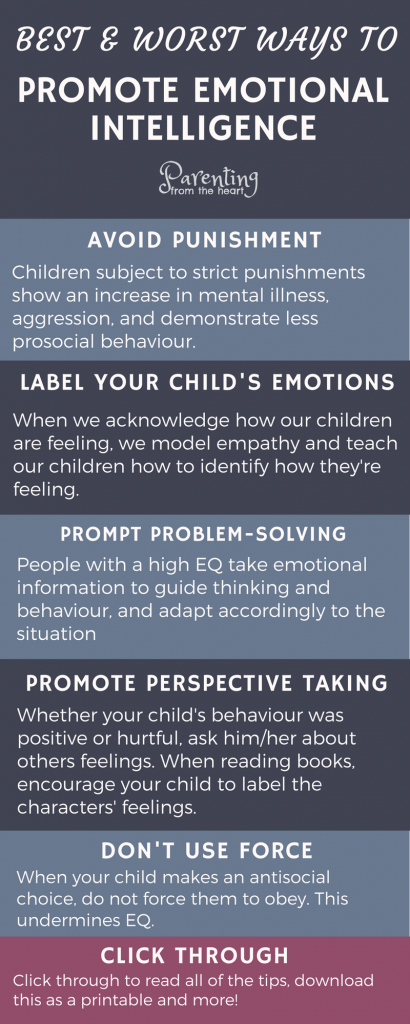One of the best predictors of success is EQ. But how do we raise emotionally intelligent children? Find out the best and worst ways to foster EQ in kids below.
Had you asked me at age 10, 20, or even 30 years old if I would ever consider sending my kids to Catholic school, my answer would be an unwavering no. The reason is that I want to raise emotionally intelligent children with high moral reasoning. And the Catholic system I grew up knowing didn’t seem like the way to do that.

This is the reason why.
The Catholic school in my hometown was antiquated. There was little room for collaboration and experiential learning. As an adult, I vowed to teach my children about my faith by example over the indoctrination I experienced.
Science confirmed what my gut told me.
Countless studies have shown that children are less likely to internalize and adopt parents’ values when punishment is used. According to Dr Laura Markham, children who learn to obey are less likely to stand up for themselves and are more capable of following orders unquestionably without taking responsibility for what they’ve done. According to Dr Gwen Dewar, children who are taught to accept a set of beliefs without question are less “resourceful, have poorer social skills, and lower self-esteem.” These kids also achieve less in school too.
Raising children with a focus on Moral Intelligence (MQ) and Emotional Intelligence (EQ) is the counterbalance.
More and more, we are finding out that IQ (intelligence quotient) is less important than we once thought at predicting future success.
Research carried out by the Carnegie Institute of Technology shows that 85 percent of your financial success is due to skills in “human engineering,” your personality and ability to communicate, negotiate, and lead. Shockingly, only 15 percent is due to technical knowledge. Additionally, Nobel Prize winning Israeli-American psychologist, Daniel Kahneman, found that people would rather do business with a person they like and trust… even if the likeable person is offering a lower quality product or service at a higher price.
This post is part of the Ontario English Catholic Teachers #catholicteachers sponsored program. I received compensation as thank you for my participation. This post reflects my personal opinion about the information provided by the sponsors.
You may be surprised to hear this but it is for these reasons that we chose to send our children to an Ontario Catholic school.
When we moved to Ontario, I was amazed to discover that the Catholic system was, in fact, the best school system for my family.
For one, the curriculum for primary grades is hands-on and child-directed. That is a must for me. In contrast to the Catholic school I knew, the Ontario Catholic system focuses on embodying values rather than prescribing them. Furthermore, the sense of community and emphasis on social responsibility are unparalleled.
For instance, my daughter comes home frequently discussing inclusion and empathy. In the schoolyard, older students act as “Junior Peacekeepers” and help primary students problem solve. Intermediate students can join a social justice group that works with different organizations throughout our city. Recently, I asked my son what happens to kids in his class when they get in trouble. He told me, “They don’t. The teacher just talks to them at the side of the room.” It warmed my heart to know these teachers are using positive disciplinary measures to build up the students in their classrooms.
[bctt tweet=”How to raise emotionally intelligent children @OECTAProv #CatholicTeachers #sponsored” username=”parentfromheart”]
Catholic teachers understand how to scaffold social and emotional development as well as teach academics. Plus, the sense of community and emphasis on social responsibility are exemplary. These teachers truly are teaching lessons for life.
Below are powerful strategies to build raise emotionally intelligent children at home.
The Best Ways to Raise Emotionally Intelligent Children: Promoting EQ and MQ
Before covering the best ways to raise emotionally intelligent children, it is important to both state and reiterates what research says doesn’t work. Research has shown these strategies hinder emotional and/ or moral intelligence:
- Indoctrination – whether it’s religiously based or another form of ideology,
- Demanding obedience, and
- Using punishment instead of positive discipline.
- Parenting that suppresses emotion is detrimental to the development of the child.
Here are practical ways to raise emotionally intelligent children.
1. Label emotions.
When we tell children we understand how they feel, they feel validated. It becomes easier for them to move on from what has upset them. We also model empathy and give them information about their emotions. Both are crucial for the development of EQ.
For example: “You’re really mad, huh?” “That’s upsetting.” “You must be so frustrated.”
These simple phrases help set our children free from the emotion they feel and give them the clarity they need to problem solve.

Prompt perspective taking Discuss the impact of your child’s actions on others.
Whether a child has acted in a prosocial way or misbehaved, he will benefit greatly from understanding how his actions impacted others. Prompt him to think about the impact of his actions on others. Scaffold his understanding by affirming what he’s said and providing deeper understanding where it’s needed.
For example, “How do you think she feels?” or “How did he react?” Or, when reading a book, ask about how the characters feel.
Remember, we want to avoid indoctrination and therefore want to avoid lecturing. When I stopped lecturing my kids, I was surprised at how often they knew exactly what they had done wrong and how to fix it.
Use modelling.
By showing our kids how we stay calm and how we express our emotions, they can learn to do the same.
For example, we experienced a huge shift in our family when I started verbalizing my inner self-talk. When I felt like yelling, I would say how I was feeling and how I would calm down. Without coaching, my daughter started saying, “I’m so mad, I feel like hitting you, but I won’t.”
Choose a school that puts an emphasis on social intelligence.
Because of the emphasis on EQ, “many schools are now teaching children to identify their own emotions and perceive the emotions of others around them.”
For example, our kids now attend Catholic school because of the emphasis on social responsibility.
The staff give students neon coloured tokens when they engage in prosocial behaviour. After accumulating a certain amount, they are able to redeem them for a privilege like having lunch with a student from another class.
Prompt problem-solving.
People with high emotional intelligence take information about others reactions and their environment to adapt their behaviours accordingly.
For example, when your child has hurt another child, ask her how she can make it better. When a peer hurts your child’s feelings, listen to him without offering advice. Then, ask him what he can do the next time something like this happens.
Discuss social issues.
Talk to your children about people in need. Discuss how they can help the less fortunate, people with special needs, or how they would react if they saw their peers being bullied. This will better the chances they will respond similarly when the opportunity arises.
For example, talk about how your child should respond if she sees a friend being hurt.
To download a printable of these tips, click here.
Raising emotionally intelligent children is about the long game. As parents, we need to embody social responsibility and support our children’s emotions. Our family has benefited greatly from a school that personifies our values.
For more information about Ontario Catholic Teachers, please visit http://www.catholicteachers.ca/LessonsForLife














3 comments